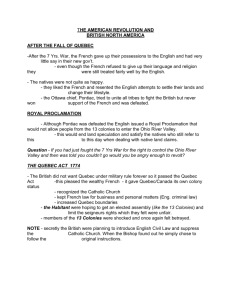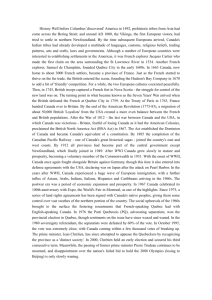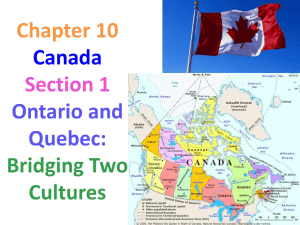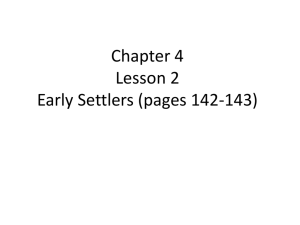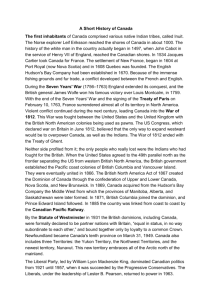Quebec - ldssnjones
advertisement
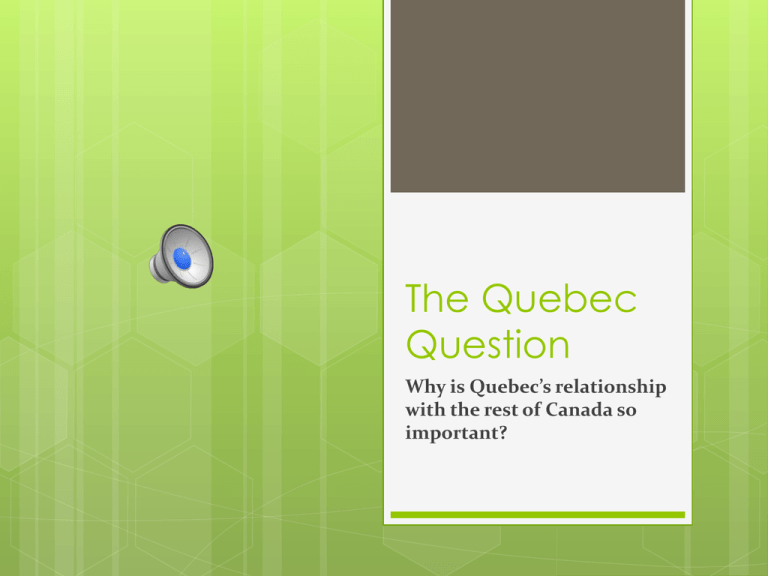
The Quebec Question Why is Quebec’s relationship with the rest of Canada so important? Learning goals: By the end of this lesson, students will be able to: describe the changes made during the Quiet Revolution in Quebec assess the positive and negative effects of the Quiet Revolution First, a video clip http://www.nfb.ca/fil m/sweater/ The Hockey Sweater The ‘Rocket’ Maurice ‘Rocket’ Richard was captain and scoring leader of the Montreal Canadiens considered a hero to Quebecers his suspension by English NHL president Campbell caused a riot in Montreal (March 17, 1955) Became a symbol of the struggle of French Canadians in Canada Duplessis’ Quebec Quebec Premier 1936-1939, 1944-1959 until he died (Union Nationale) wanted traditional life and values kept federal government interference to a minimum allowed English investment in Quebec – controlled good paying jobs Results of Duplessis’ rule French Canadians did not get the education needed to be competitive in the postwar era (ex. science, engineering…) big business belonged to English speaking Canadians French Canadians felt like 2nd class citizens in their own country The Quiet Revolution by 1960, Jean Lesage and the Liberals promised a ‘Quiet Revolution’ in Quebec Lesage introduces key changes: modernized education system joined Canada’s Medicare program limited influence of Catholic Church on education nationalized companies (ex. Hydro Quebec) made French the language of the workplace used key slogans to gain support: ‘maitres chez nous’ (masters in our own house, je me souviens (I will remember), la survivance (survival of French) Outcomes of the Quiet Revolution French Canadians realized the extent of the discrimination they had endured. French Canadian and English Canadian relations now tense Some felt he didn’t do enough – rise of separatist groups (FLQ bombings 1960’s) Quebec Part 2 The rise of the Separatist Movement(the 1960’s and 70’s) - wanting to make Quebec an independent country - from ‘separate’ = to divide into parts SEPARATIST - wanting to leave a union or confederation - noun is ‘separatism’ Events leading to the Separatist Movement Quebec in the 1960’s present Expo 67 Canada (Montreal) hosts the World Fair - celebrates our centenary (100 years) 50 million visitors from 60 countries visited French president Charles DeGaulle delivers a speech to a roaring enthusiastic crowd “vive le Quebec libre” viewed as a rallying cry for Quebec separation FEDERAL GOVERNMENT’S RESPONSE: Royal Commission Bilingualism and Biculturalism Recommendations Canada should be a billingual country Eng & Fr. Official languages of parliament and federal courts Results: Suggestions are adopted, and become official 1968: The Official Languages Act-Canada is officially bilingual (civil service, signage, packaging, etc) STILL NOT ENOUGH!!! The October Crisis!!! a radical separatist group called the FLQ (Front de Liberation du Quebec) demands action in 1970! kidnapped political figures (British Diplomat and Quebec Cabinet Minister) resort to murder when demands not met Trudeau invokes War Measures Act to stop them! A Brief History Rise of the Parti Quebecois Rene Levesque forms a new party (PQ) and becomes Premier of QUE. in 1976 promises major changes! introduces Bill 101 – the ‘sign law’ holds a referendum on Quebec sovereignty – Trudeau fights for Canada! Result of 1980 Referendum Levesque’s Yes side 40% Trudeau’s No side wins 60% of the vote Referendum: process that allows every citizen say on some question of importance to a nation or community. Other events in the Separatist Movement 1982 Constitution debate (Que. Doesn’t sign it) 1990 Meech Lake Accord - conference (try to change the Constitution) 1992 Charlottetown Accord - conference (same as above) 1995 Referendum on separation – so close!!! (49.4% YES and 50.6% NO)
![Garneau english[2]](http://s3.studylib.net/store/data/009055680_1-3b43eff1d74ac67cb0b4b7fdc09def98-300x300.png)

